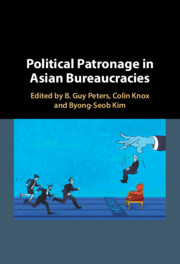Book contents
- Political Patronage in Asian Bureaucracies
- Political Patronage in Asian Bureaucracies
- Copyright page
- Contents
- Figures
- Tables
- Contributors
- Abbreviations
- 1 Patronage in Asian Political Systems
- Part I One-Party Dominated Systems
- Part II Two-Party/Multi-Party Systems
- Part III Autocracies
- 10 Varieties of Patronage in a Single-Party State
- 11 Party Patronage in Kazakhstan
- 12 Political Patronage in Vietnam
- 13 Political Patronage in Asian Bureaucracies
- Index
- References
11 - Party Patronage in Kazakhstan
from Part III - Autocracies
Published online by Cambridge University Press: 05 October 2023
- Political Patronage in Asian Bureaucracies
- Political Patronage in Asian Bureaucracies
- Copyright page
- Contents
- Figures
- Tables
- Contributors
- Abbreviations
- 1 Patronage in Asian Political Systems
- Part I One-Party Dominated Systems
- Part II Two-Party/Multi-Party Systems
- Part III Autocracies
- 10 Varieties of Patronage in a Single-Party State
- 11 Party Patronage in Kazakhstan
- 12 Political Patronage in Vietnam
- 13 Political Patronage in Asian Bureaucracies
- Index
- References
Summary
Patronage is a broad concept that can be used to describe such practices as clientelism and corruption. More specifically, this chapter considers party patronage where political parties ‘appoint individuals to (non-elective) positions in the public and semi-public sector’ (Kopecký et al, 2016). The research builds on the widening global database that measures the scope and depth of party patronage by examining public sector appointments in Central Asian countries. Of specific interest is why authoritarian states engage in patronage appointment practices when the dominant parties are already inextricably linked to the political elite. The study uses Kazakhstan as the site of enquiry and, through proxy indicators, extends the geography to consider Central Asia as a whole. We find the scope and depth of party patronage crosses all key policy sectors and reaches from the top to the lower tiers of governance. Looking at the trends for Central Asian countries since independence from the Soviet Union in 1991, party patronage shows no signs of abating.
- Type
- Chapter
- Information
- Political Patronage in Asian Bureaucracies , pp. 260 - 287Publisher: Cambridge University PressPrint publication year: 2023



